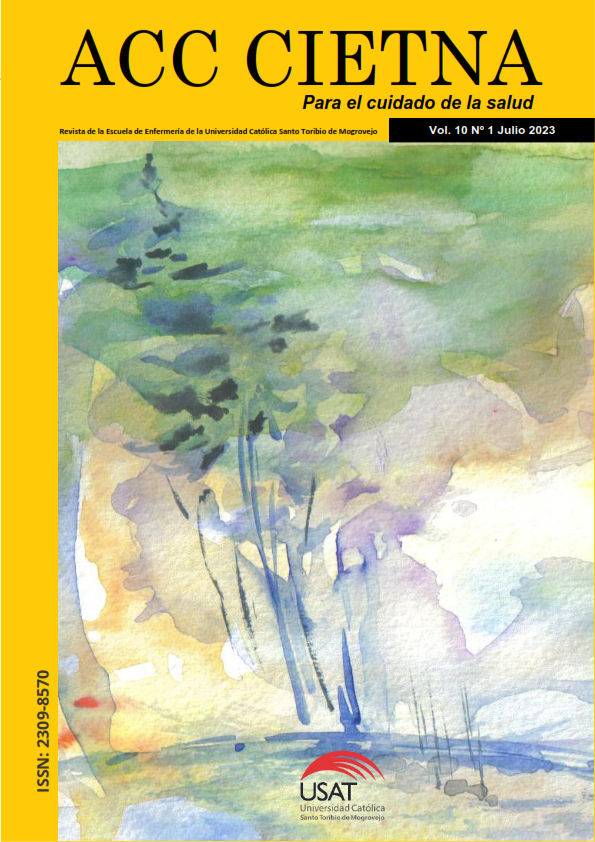Abstract
Care is a fundamental task for the promotion of the common good of society, where the ethical mark is given by solidarity, and since being in the health world is going further, it is a challenge to promote it within public policies because this is not It is a burden for the people, nor for the state, but as described at the beginning, it reflects being in the efforts of everyone within a society cultured by solidarity, where friendly treatment stands out without excluding anyone.
Abstract
Care is a fundamental task for the promotion of the common good of society, where the ethical mark is given by solidarity, and since being in the health world is going further, it is a challenge to promote it within public policies because this is not It is a burden for the people, nor for the state, but as described at the beginning, it reflects being in the efforts of everyone within a society cultured by solidarity, where friendly treatment stands out without excluding anyone.
Keywords: Research, Nursing, Care.
Editorial
Las referencias vitales en el mundo sanitario son las personas1, cada una con su actividad mental propia donde coexisten los pensamientos, los estados de ánimo y el comportamiento, los cuales logran desarrollarse dentro de un ambiente sociocultural adecuado en el que han sido formuladas sus ideas, sus convicciones, el sentido del valor y el modelo de comportamiento, con influencia también en su actitud ante los cambios producidos en el mundo externo.
Bien es conocido que cada cultura, posee un sentir específico sobre el cuidado y se trata de un sentir que debe ser respetado, porque forma parte de la estructura íntima en la existencia personal, de esta forma interviene la ética, también con su propia organización intentando construir estructuras a las cuales se van adaptando profesionales y personas cuidadas, existe el arte de compartir el conocimiento, intercambiar competencias con una ciencia común que persigue proteger la vida como un todo integrado como meta, donde la pericia de enfermería logra la interconectividad del cuerpo doliente, la mente preocupada, la variedad de emociones y un espíritu que sostenido en el cuerpo enfermo clama cuidado completo y con ello la transformación de optar por la vida, con anhelos de felicidad y querer rectificar el error o las equivocaciones inadvertidas.
Y los profesionales de Enfermería (PE) son parte de estas referencias vitales quienes, imbuidos en el mundo sanitario, razonan sobre el sentir de las personas reales posesionándose ante ellas con una actitud franca, atenta y silenciosa que les permite descubrir el impacto de sus aspiraciones, dolencias e inquietudes, con afán de ir a la esencia de los sucesos en primer lugar para comprenderlas y después para ayudarles a organizarlas.
En este arte de organización ponen en juego su tesón ético en la entrega generosa, constante, sustentada en el servicio abnegado, se dan perfecta cuenta que el mundo les habla, a través de la variedad de culturas o costumbres vinculadas al modo de vida de los pacientes, familias, colegas o grupos interdisciplinarios específicos e intentan mantenerse aperturados, pero no conformistas, característica que hace que el cuidado de los PE sean transformadores, al saber dar respuestas a las necesidades captadas de los pacientes, y de todo ser humano necesitado.
Entonces introducidos en los afanes de las personas, los PE saben estar atentos para que en cada acto de cuidado emerja el valor humano, enclaustrado en una sociedad tecnificada, buenísima como apoyo para el cuidado integral, pero no reemplazante del cuidado humano que siempre ha buscado ayudar a las personas con dolencias inimaginables a encontrar la paz, la comodidad, la armonía y el equilibrio perdido por la afectación de crisis o enfermedades terminales, desastres económicos o fracturación familiar.
Dentro de estas perspectivas juega un rol importante las relaciones interpersonales2 con todos y con todo para continuar profundizando sobre nuevas necesidades, vacíos, estados de ánimo, costumbres o valorar si el bienestar está presente en quienes les rodean, incluso con el cuidado de los PE, como condicionante para el cuidado de los pacientes, puesto que los desafíos éticos que siempre enfrentan y enfrentaran están en consonancia con sus condiciones laborales.
Por lo descrito, el cuidado, es una labor fundamental para el fomento del bien común de la sociedad, donde la marca ética lo da la solidaridad, y como estar en el mundo sanitario es ir más allá , es un reto propiciarlo dentro de las políticas públicas3 porque este no es una carga para las personas, tampoco para el estado, sino como se describía al inicio refleja estar en los afanes de todos dentro de una sociedad culturizada por la solidaridad, donde el trato amable sobresale sin exclusión de nadie.
En este sentido y de acuerdo con el director general de la OMS4, en su importante anuncio en el pasado Congreso del CIE, es necesario ocuparse en distintos entornos para transformar y preservar a los PE, otorgando recurso humano suficiente que asegure cuidados de alta calidad, además garantice la protección de los enfermos, pero también que los PE intervengan en cuestiones esenciales visibilizados en sueldos justos, contextos laborales dignos, seguros y donde prime el respeto mutuo, con iniciativas estratégicas para el crecimiento y desarrollo de un oportuno liderazgo, formación excelente y que enfermería crezca en todo el mundo.
Editorial
The vital references in the health world are people1, each with their own mental activity where thoughts, moods and behavior coexist, which manage to develop within an adequate socio-cultural environment in which their ideas, convictions, sense of value and behavioral model have been formulated, with influence also on their attitude towards the changes produced in the external world.
It is well known that each culture has a specific feeling about care and it is a feeling that must be respected, because it is part of the intimate structure in the personal existence, in this way the ethics intervenes, also with its own organization trying to build structures to which professionals and cared people adapt, there is the art of sharing knowledge, exchanging competences with a common science that pursues to protect life as an integrated whole as a goal, where the nursing expertise achieves the interconnectivity of the suffering body, the worried mind, the variety of emotions and a spirit that sustained in the sick body cries out for complete care and with it the transformation of opting for life, with longing for happiness and wanting to rectify the error or inadvertent mistakes.
And nursing professionals (EPs) are part of these vital references who, imbued with the healthcare world, reason about the feelings of real people by taking possession of them with a frank, attentive and silent attitude that allows them to discover the impact of their aspirations, ailments and concerns, with the desire to go to the essence of events first to understand them and then to help them organize them.
In this art of organization they put into play their ethical tenacity in the generous, constant delivery, sustained in selfless service, they perfectly realize that the world speaks to them, through the variety of cultures or customs linked to the way of life of patients, families, colleagues or specific interdisciplinary groups and try to remain open, but not conformist, a feature that makes the EP care transformers, knowing how to respond to the needs of patients, and every human being in need.
Therefore, when introduced into people's concerns, EPs know how to be attentive so that the human value emerges in every act of care, cloistered in a technified society, very good as a support for integral care, but not replacing the human care that has always sought to help people with unimaginable ailments to find peace, comfort, harmony and balance lost due to crises or terminal illnesses, economic disasters or family fracture.
Within these perspectives, interpersonal relationships2 with everyone and everything play an important role in order to continue to explore new needs, gaps, moods, habits or to assess whether wellbeing is present in those around them, including the care of EPs, as a condition for patient care, since the ethical challenges they always face and will face are in line with their working conditions.
Therefore, care is a fundamental task for the promotion of the common good of society, where the ethical mark is given by solidarity, and as being in the health world is to go beyond, it is a challenge to promote it within public policies3, because this is not a burden for people, nor for the state, but as described at the beginning reflects being in the efforts of all within a society cultured by solidarity, where the friendly treatment stands out without exclusion of anyone.
In this sense and according to the Director General of the WHO4, in his important announcement at the last ICN Congress, it is necessary to work in different environments to transform and preserve EPs, providing sufficient human resources to ensure high quality care, as well as guaranteeing the protection of the sick, but also that EPs intervene in essential issues visible in fair wages, decent and safe working environments where mutual respect prevails, with strategic initiatives for growth and development of timely leadership, excellent training and that nursing grows around the world.
Referencias
- Polo L. Quién es el Hombre. Un espíritu en el tiempo. 7a Ed. Madrid. España. Ed. Rialp. 2021, p.264
- Manookian A, Nayeri ND, Dashti S, Shahmari M. Ethical challenges to the self-care of nurses during the covid-19 pandemic [Desafíos éticos para el autocuidado de las enfermeras durante la pandemia de covid-19]. Nurs Ethics [Internet]. 2023; Disponible en: http://dx.doi.org/10.1177/09697330231180753
- Yáñez K, Rivas E, Campillay M. Ethics of Care and Nursing Care [Ética del Cuidado y Cuidado de Enfermería]. Enfermería (Montevideo) [Internet]. 2021 Jun [citado 2023 Jul 25]; 10(1): 3-17. Disponible en: https://doi.org/10.22235/ech.v10i1.2124
- CIE. Importante anuncio del Director General de la OMS durante el Congreso del CIE: habrá un nuevo informe sobre la Situación de la Enfermería en el Mundo en 2025 [Internet]. [citado el 26 de julio de 2023]. Disponible en: https://www.icn.ch/es/noticias/importante-anuncio-del-director-general-de-la-oms-durante-el-congreso-del-cie-habra-un
References
- Polo L. Quién es el Hombre. Un espíritu en el tiempo. 7a Ed. Madrid. España. Ed. Rialp. 2021, p.264
- Manookian A, Nayeri ND, Dashti S, Shahmari M. Ethical challenges to the self-care of nurses during the covid-19 pandemic [Desafíos éticos para el autocuidado de las enfermeras durante la pandemia de covid-19]. Nurs Ethics [Internet]. 2023; Disponible en: http://dx.doi.org/10.1177/09697330231180753
- Yáñez K, Rivas E, Campillay M. Ethics of Care and Nursing Care [Ética del Cuidado y Cuidado de Enfermería]. Enfermería (Montevideo) [Internet]. 2021 Jun [citado 2023 Jul 25]; 10(1): 3-17. Disponible en: https://doi.org/10.22235/ech.v10i1.2124
- CIE. Importante anuncio del Director General de la OMS durante el Congreso del CIE: habrá un nuevo informe sobre la Situación de la Enfermería en el Mundo en 2025 [Internet]. [citado el 26 de julio de 2023]. Disponible en: https://www.icn.ch/es/noticias/importante-anuncio-del-director-general-de-la-oms-durante-el-congreso-del-cie-habra-un




















 BIBLIOTECA USAT
BIBLIOTECA USAT